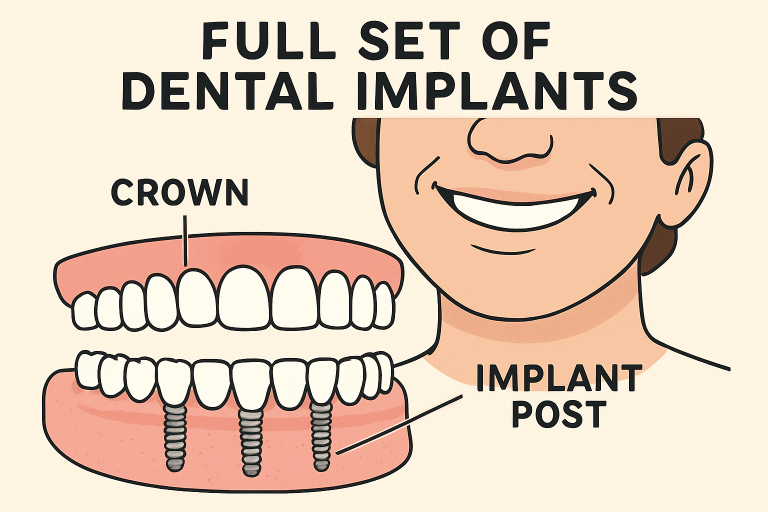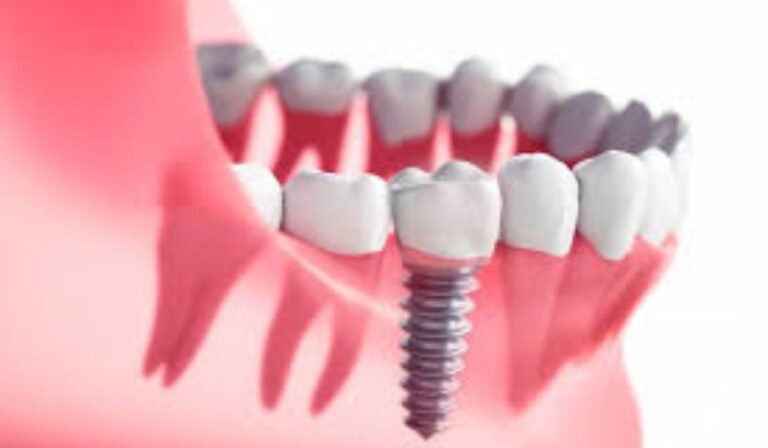Dental implants have transformed restorative dentistry, offering a stable and attractive solution for those who have lost teeth. Whether missing one tooth or requiring a full-mouth restoration, modern dental techniques can now provide complete sets of permanent and natural-feeling teeth. For patients ready to restore their smile and oral health, full arch dental implants represent a transformative solution for comprehensive tooth loss.
If you’re considering dental implants to replace all your teeth, it’s essential to familiarize yourself with the treatment process, benefits, and important considerations before proceeding. Understanding all the necessary steps can ensure a smoother experience and a better outcome. Dental implants successfully mimic real teeth in appearance and function, but require careful planning, consistent maintenance, and investment.
The path to a new smile depends on the latest technology, your commitment to health, and a partnership with a skilled provider. Patients are encouraged to thoroughly research clinics, discuss expectations, and ensure they are good candidates for the procedure. This proactive approach lays the groundwork for success.
This guide breaks down the entire process of getting a complete set of dental implants, from initial assessment to long-term aftercare, so you can confidently make the best decision for your dental health. For more background on how implants work and their broader use, check out this resource from the Mayo Clinic.
What Are Dental Implants?
Dental implants are biocompatible posts, often made from titanium, that are surgically inserted into the jawbone to replicate the function of tooth roots. They form a sturdy foundation to which individual crowns, bridges, or complete sets of teeth can be attached. Unlike removable dentures, implants fuse with your bone over time, providing long-term stability and strength—an ideal choice for those with significant tooth loss due to decay, trauma, or advanced gum disease.
The Dental Implant Procedure
The journey to a complete set of implants is multi-staged:
- Initial Consultation: Dentists conduct detailed evaluations, including digital scans, X-rays, and, if necessary, 3D imaging to determine bone structure and ensure enough healthy bone is present for implant anchorage.
- Site Preparation: If existing teeth fail or decay is prevalent, extractions will be performed, possibly followed by bone grafting for those with insufficient bone density.
- Implant Placement: Under local anesthesia, implants are surgically inserted into the jaw. Multiple implants may be needed to secure a complete set, often using four to eight posts per arch.
- Healing and Osseointegration: Over several months, bone tissue integrates with the implant, creating a stable bond and allowing for the safe attachment of artificial crowns later.
- Abutment and Restoration: After healing, custom abutments and permanent crowns, bridges, or full-arch prostheses are fitted, completing your smile restoration.
Dental professionals manage discomfort throughout the procedure and monitor progress to ensure optimal healing and results.

Benefits of Dental Implants
- Realistic Appearance: Implants are crafted to look and feel like your teeth, boosting self-confidence and comfort.
- Stability and Chewing Power: A complete set of implants restores natural chewing abilities, letting you eat nearly any food without worry.
- Preservation of Facial Structure: By stimulating jawbone tissue, implants help prevent bone loss that often occurs with missing teeth and traditional dentures.
- Longevity: With proper maintenance, dental implants can serve you for decades—often a lifetime.
- Easier Maintenance: Implants can be brushed and flossed alongside your natural gums, simplifying oral care routines compared to removable dentures.
- No Slippage or Speech Impairment: Implants are secure and don’t shift, eliminating speech difficulties and the embarrassment of loose dentures.
Considerations and Risks
While outcomes are overwhelmingly positive, patients should be aware of certain risks and limitations before opting for full dental implants:
- Infection or Implant Failure: Although rare, infections or insufficient bone integration can occur, potentially requiring additional procedures.
- Nerve Damage and Sinus Problems: In rare cases, surgery can impact local nerves or sinus cavities, causing temporary or persistent discomfort.
- Health Conditions: Chronic illnesses such as diabetes or immune-suppressing disorders can slow healing and increase complication risks, making candidacy evaluation critical.
- Lifestyle Habits: Smoking and poor oral hygiene significantly raise the risk of complications and reduce implant longevity. Research indicates that smokers have a higher risk of implant failure compared to non-smokers. A systematic review and meta-analysis found that the odds of implant failure in smokers were 2.25 times higher than in non-smokers. Additionally, smoking can impair healing and increase the risk of peri-implantitis, a condition characterized by inflammation around the implant.
Clear communication with your dentist and full disclosure of your medical history are essential for a smooth procedure and optimal results.
Cost and Insurance
The price of a complete set of dental implants can vary based on your location, provider experience, and specific medical requirements. A single implant often totals $3,000 to $5,000, while a full mouth of implants starts around $30,000 and can exceed $50,000. Many dental insurance plans still classify implants as cosmetic and may not offer coverage, but certain situations or supplementary health insurance may reduce costs. Detailed consultations with your insurance company and financial planner will help manage the investment.
Aftercare and Maintenance
- Commit to Oral Hygiene: Brushing, flossing, and using oral rinses are critical for maintaining implant health and preventing infection.
- Routine Dental Visits: Schedule cleanings and professional examinations every six months to ensure all components remain secure and healthy.
- Avoid Harmful Habits: Chewing ice, biting fingernails, or using tobacco can damage new implants and natural gum tissue.
With these measures in place, well-maintained implants can provide satisfaction and reliability for many years.
Alternatives to Dental Implants
- Bridges: Dental bridges fill gaps with artificial teeth anchored by natural teeth or implants, but they may require the filing down of healthy adjacent teeth.
- Dentures: Removable dentures are a more affordable solution for extensive tooth loss, but can be less stable and may contribute to bone loss over time.
The right choice will depend on your medical history, preferences, and long-term dental goals, so it is advised that you have a thorough discussion with your dental care provider.
Conclusion
Investing in a complete set of dental implants is a rewarding process that can restore function, confidence, and aesthetics for individuals with significant tooth loss. By understanding what’s involved in the procedure, weighing the benefits, and considering potential challenges, you can approach dental implants as an informed and empowered patient.
Consultation with an experienced professional will provide a personalized plan to ensure the best results for your unique smile.
